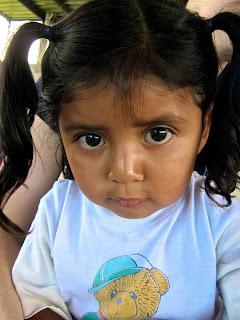This would be exciting news had I not actually arrived home over a month ago.
Sorry for the delay in posting this, although I actually have something exciting to share!
an ESSAY! I know-super exciting, right?! I was required to write it for my school.. it's just me "reflecting" on some of my Quitanian adventures.
If you're a super nice person and actually feel compelled to read my essay, please feel free to leave any suggestions! I'm not quite finished editing, so if I misspelled something or if I simply fail to make sense please oh please let me know.
I know it may be a little dry, but I'll try to keep it entertaining by sprucing it up with some pictures of ecuadorable chillens.
here goes..
Funny thing about this picture- the boy on the right gave me the finger seconds after this picture was taken. He was a bit perturbed that I wouldn't let him hold my camera.
Reaching for a Smile
Having only returned from Ecuador a month earlier, I have made little progress in making sense of my collective experiences. I journeyed to Ecuador in the hopes of instigating some sort of positive change on the lives of the children there, and maybe by extension the Ecuadorian community. Thus, I was not only motivated by my own desire to contribute to the global community, but I was also pursuing a soul-enriching experience of sorts that I hoped would lead to the next step of my self-actualization. I soon discovered I had hugely underestimated the essential processes that must be undergone in order to bring about change in a community. I came to realize that the children I worked with, perpetually trapped in the markets of Quito for over twelve hours a day, affected a greater change in me than I did for them. In my naivety, I had hoped—or rather, expected—to see some sort of tangible evidence that I had marginally affected the lives of the market children. I realize now, however, that my overall vision was too limited and self-serving. After seven weeks of working with, playing with, and loving these children, I eventually came to measure my success in the markets by small moments of elucidation rather than tangible results.
The children themselves lived in unforgiving destitute conditions unlike anything I had previously seen. They scrape by in an impoverished environment by emotionally detaching themselves from their surroundings, remaining stone-faced throughout the day. From a safe distance many children would watch our activities, only too aware of the transience of the happy experience. Despite the fact that this was not my first encounter with children who are the product of third-world poverty, I had never before seen children so reluctant to smile. However, what I found most perplexing was their yearning for closeness; they would sit with me, put their heads on my lap, hold my hand, or ask to be picked up—all the while totally expressionless. This paradox utterly bewildered me. It was as if they believed happiness could only be ephemeral, but desired it nevertheless. When they smiled, for just a brief moment they were simply children, happy to be playing singing and dancing with strange adults who inexplicably loved them. Through these children, I learned to cherish those rare moments that I reached for a smile and found one.
The market children hold little emotional significance for their parents, who oftentimes find purely economical value in them. They arrive at the markets each morning around five each morning and work over twelve hours a day alongside their parents. These children are therefore not enrolled in school and instead don child-sized aprons—which would only be worn by children in the United States for a simple game of dress-up. However, unlike games of pretend in the United States, the aprons hold only practical significance for the market children. Many parents recognize the potential children have for earning money for the family and teach them to skillfully pickpocket unsuspecting “gringos,” or fair-skinned foreigners passing through the markets. They also understand that children are more likely to earn foreigners’ sympathy; their children wander through the streets, oftentimes at night, selling gum and cigarettes, the parents using their child’s pitiful state to their monetary advantage.
Halfway through my time in Ecuador, I began to question the true impact of UBECI—the organization I was volunteering with. After three weeks of doing the same puzzles, singing the same songs, and relentlessly reviewing the same colors over and over and over again, I wondered how much change this method could really instigate. I couldn’t understand how this could break the inevitable, cyclical nature of their existences; they would grow up uneducated—although they may recall the colors we drill into their heads—and in all likelihood, grow up to run their own stall in the market, like their parents before them.
However, through small moments of clarity I eventually came to value the true merits of UBECI. I learned how the organization works behind the scenes, making personal visits to families and schools in an attempt to enroll the children there and ensure a brighter future. I also learned of the importance of a smile, however transient it may be. One day in the market, I encountered a set of siblings who, through their simple selflessness, illuminated the significance of organizations like UBECI. I was given the task of caring for one little girl who couldn’t have been more than a year old. She was crying incessantly, and while I could calm her down for a couple minutes, I was unable to keep her happy for more than three minutes at a time. As I was standing away from the rest of the group, a little girl around three years old walked over to me, her hands outstretched. The baby girl reached out for the three year old, and I learned that this three year old was in fact the baby girl's sister. Then, their five-year-old sister joined us to share the burden of caring for their youngest sister. The three of us sat down in a circle and took turns holding the relentlessly crying baby. At one point, the oldest sister, only five years old, sat in my lap as she was holding the baby. It was as if she understood the responsibilities she had as an older sister, but simply yearned to have the closeness of an adult. She wanted to simply be a child while simultaneously recognizing her role in her baby sister's well being. I realized that UBECI must provide the only real breaks these sisters have had in taking care of their baby sister. UBECI provides these working children small breaks in their responsibilities and a few fleeting hours to simply be loved by adults.
My experiences in Ecuador made me ponder the nature of the philanthropic spirit and the intricate complexities of “changing-the-world.” I, like many bright-eyed and idealistic college students, volunteered abroad in the hope that I could bring about a small amount of tangible evidence that I had done some good for the global community. However, all I really did for the children was assist in providing a few, transient moments of happiness that they may not have experienced otherwise. Although I don’t believe I’ll ever fully comprehend the complexities of “world-changing,” I have learned the importance of a smile, however short-lived it may be. Emerson once said “…To know even one life has breathed easier because you have lived, this is to have succeeded.” I thus count my short-lived experiences in Ecuador a success. While I know that UBECI is at this very moment still working to combat the cyclical nature of the market children’s existences, I know that my small contribution to the program will be a part of the organization’s overall success. And for that, I am forever grateful.
Again, I know I generally fail at making sense, so please let me know if you have any suggestions!























